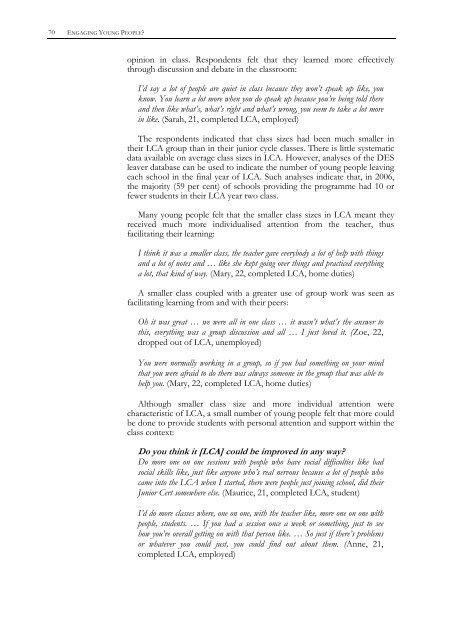70 ENGAGING YOUNG PEOPLE?opinion in class. Respondents felt that <strong>the</strong>y learned more effectivelythrough discussion and debate in <strong>the</strong> classroom:I’d say a lot <strong>of</strong> people are quiet in class because <strong>the</strong>y won’t speak up like, youknow. You learn a lot more when you do speak up because you’re being told <strong>the</strong>reand <strong>the</strong>n like what’s, what’s right and what’s wrong, you seem to take a lot morein like. (Sarah, 21, completed LCA, employed)The respondents indicated that class sizes had been much smaller in<strong>the</strong>ir LCA group than in <strong>the</strong>ir junior cycle classes. There is little systematicdata available on average class sizes in LCA. However, analyses <strong>of</strong> <strong>the</strong> DESleaver database can be used to indicate <strong>the</strong> number <strong>of</strong> young people leavingeach school in <strong>the</strong> final year <strong>of</strong> LCA. Such analyses indicate that, in 2006,<strong>the</strong> majority (59 per cent) <strong>of</strong> schools providing <strong>the</strong> programme had 10 orfewer students in <strong>the</strong>ir LCA year two class.Many young people felt that <strong>the</strong> smaller class sizes in LCA meant <strong>the</strong>yreceived much more individualised attention from <strong>the</strong> teacher, thusfacilitating <strong>the</strong>ir learning:I think it was a smaller class, <strong>the</strong> teacher gave everybody a lot <strong>of</strong> help with thingsand a lot <strong>of</strong> notes and … like she kept going over things and practiced everythinga lot, that kind <strong>of</strong> way. (Mary, 22, completed LCA, home duties)A smaller class coupled with a greater use <strong>of</strong> group work was seen asfacilitating learning from and with <strong>the</strong>ir peers:Oh it was great … we were all in one class … it wasn’t what’s <strong>the</strong> answer tothis, everything was a group discussion and all … I just loved it. (Zoe, 22,dropped out <strong>of</strong> LCA, unemployed)You were normally working in a group, so if you had something on your mindthat you were afraid to do <strong>the</strong>re was always someone in <strong>the</strong> group that was able tohelp you. (Mary, 22, completed LCA, home duties)Although smaller class size and more individual attention werecharacteristic <strong>of</strong> LCA, a small number <strong>of</strong> young people felt that more couldbe done to provide students with personal attention and support within <strong>the</strong>class context:Do you think it [LCA] could be improved in any way?Do more one on one sessions with people who have social difficulties like badsocial skills like, just like anyone who’s real nervous because a lot <strong>of</strong> people whocame into <strong>the</strong> LCA when I started, <strong>the</strong>re were people just joining school, did <strong>the</strong>irJunior Cert somewhere else. (Maurice, 21, completed LCA, student)I’d do more classes where, one on one, with <strong>the</strong> teacher like, more one on one withpeople, students. … If you had a session once a week or something, just to seehow you’re overall getting on with that person like. … So just if <strong>the</strong>re’s problemsor whatever you could just, you could find out about <strong>the</strong>m. (Anne, 21,completed LCA, employed)
SCHOOL EXPERIENCES AND LEARNING PROCESSES AMONG LCA PARTICIPANTS 71In addition to <strong>the</strong> use <strong>of</strong> different teaching approaches within <strong>the</strong>classroom, LCA graduates reported <strong>the</strong> variety <strong>of</strong> activities, such as fieldtrips, which took place outside <strong>the</strong> school building. The interviewshighlighted <strong>the</strong> effectiveness <strong>of</strong> fieldtrips in <strong>the</strong> learning process anddeveloping morale within <strong>the</strong> class.It was more visual and getting out <strong>the</strong>re and experiencing it for yourself more,ra<strong>the</strong>r than just sitting <strong>the</strong>re and reading it from <strong>the</strong> book, you more enjoyed it.(Mary, 22, completed LCA, home duties)The whole class, like we just got on so well and you know, it was working as part<strong>of</strong> a team and you know having to do key assignments and tasks and havedeadlines and we also went out on like great trips, we went down to Carlow for<strong>the</strong> adventure centre, we went out on <strong>the</strong> Dublin bus tour. (Niamh, 21,completed LCA, employed)Some schools were more active than o<strong>the</strong>rs but <strong>the</strong>se activities allowedstudents to become more involved in <strong>the</strong>ir community and improve <strong>the</strong>irself-confidence:I loved going out like …, you had to go to different places and do things, make<strong>the</strong> phone calls, it just gets you more socially involved I think, you know, outside<strong>of</strong> school like. (Sarah, 21, completed LCA, employed)It was good to get out <strong>of</strong> school as well like, you’re not always in <strong>the</strong> school, youwere always <strong>of</strong>f, <strong>the</strong>y brought us to, you know, Drink Aware, like AA meetingsand all, to see what goes on, you know. (Andrew, 21, completed LCA,apprentice)In sum, LCA classes tend to be characterised by more active teachingand learning methodologies. These approaches were generally seen asenhancing learning, a process which was fur<strong>the</strong>r reinforced by smaller classsize and more individual attention from teachers. Group work was seen asan effective way to promote learning from and with peers. Many LCAstudents were also given <strong>the</strong> opportunity to engage in activities outside <strong>the</strong>classroom, such as field trips which were popular with <strong>the</strong> young peopleinterviewed.5.5Approach toAssessmentThe LCA and LCE/LCVP programmes differ markedly in <strong>the</strong>ir approachto assessment. Performance in LCA is assessed over <strong>the</strong> two years <strong>of</strong> <strong>the</strong>programme and is based on <strong>the</strong> completion <strong>of</strong> modules, <strong>the</strong> performance<strong>of</strong> tasks and performance in terminal examinations. In contrast, LCE andLCVP assessment is much more reliant on terminal examinations. For <strong>the</strong>majority <strong>of</strong> respondents, one <strong>of</strong> <strong>the</strong> most positive aspects <strong>of</strong> LCA was <strong>the</strong>system <strong>of</strong> modular credit accumulation. The interviews highlighted <strong>the</strong>change in attitudes to learning and assessment among many <strong>of</strong> <strong>the</strong>respondents during <strong>the</strong> course <strong>of</strong> <strong>the</strong> programme. Many respondents wereattracted to LCA by its structure <strong>of</strong> credit accumulation and found over <strong>the</strong>two year period that <strong>the</strong>ir grades, attendance and overall interest in schoolimproved under <strong>the</strong> new system. Of particular note was <strong>the</strong> reference to a‘less stressful’ school environment as <strong>the</strong>y built up credits throughout <strong>the</strong>year through <strong>the</strong> completion <strong>of</strong> project work and modules ra<strong>the</strong>r thanrelying on <strong>the</strong>ir performance in a terminal examination:

















